[toc]
This section provides an overview of the implementation status of the 44 initiatives. It then goes on to describe the progress of initiatives according to the Phase One objectives. The section describes how initiatives are working collectively to build on reform efforts already underway across the service, to drive reform outcomes, as opposed to discrete initiatives working independently of one another. Detailed descriptions of the status of each initiative and their achievements to date are included in Attachment A.
Insights derive from the APS’s Reform reporting model, used to track the implementation status of initiatives. To ensure successful implementation, the APS Reform Office centrally tracks and reports on all initiatives. In recognition of the importance of minimising reporting burdens, formal reporting is pursued quarterly with status updates pursued in between where necessary. Agencies are required to provide updates on their initiatives’ delivery status, milestones, capability uplift, outcomes and risk.
Implementation has progressed against objectives
Exhibit 4 on page 15 summarises the distribution of initiatives according to their current stage of delivery. These insights are self-reported by project teams as at 4 October 2023.
At present, 10 of the 44 initiatives are complete and have transitioned to business-as-usual in the service. Many relate to changes to overarching decision-making bodies or the establishment of new institutions within the APS. Completed initiatives include two election commitments: the establishment of a National Anti-Corruption Commission and completion of an audit of employment.
Delivery is underway for 15 of the 44 initiatives. These include integrity-related initiatives and reforms to make the APS a model employer, as well as continuing to build on the previous reform work such as the establishment of the APS Surge Reserve workforce and the APS Academy.
Initiatives that remain in the planning or design stages are those which either depend on, or would benefit from, more comprehensive consultation and data to best understand complexities, or to devise a solution that can incorporate stakeholder views. These include workforce planning-related initiatives and capability-related initiatives that aim to boost strategic skills.
Every initiative within the APS Reform agenda is working to progress at least one of the eight APS Reform outcomes. These outcomes describe the desired end-state of the APS Reform program, providing direction for the reform initiatives which each contribute to the transformation. Most initiatives, as a result of the interconnected nature of reform, will also help to progress secondary reform outcomes in addition to their primary one. This is designed so that APS Reform makes a greater impact than the sum of its individual initiatives.
The APS is embedding capability uplift through the collective implementation of reform initiatives. The development and implementation of a particular reform may require uplifting the skills of the team leading it, with that capability improvement then extending beyond APS reform implementation. Capability areas strengthened by reform initiatives include project management and strategic policy advice, use of data in evidence-based policy, outcomes-based working, promotion of active engagement and partnership, and cultural capability.
Exhibit 4: Summary of initiatives by stage of project lifecycle

| Initiatives | |||
Image
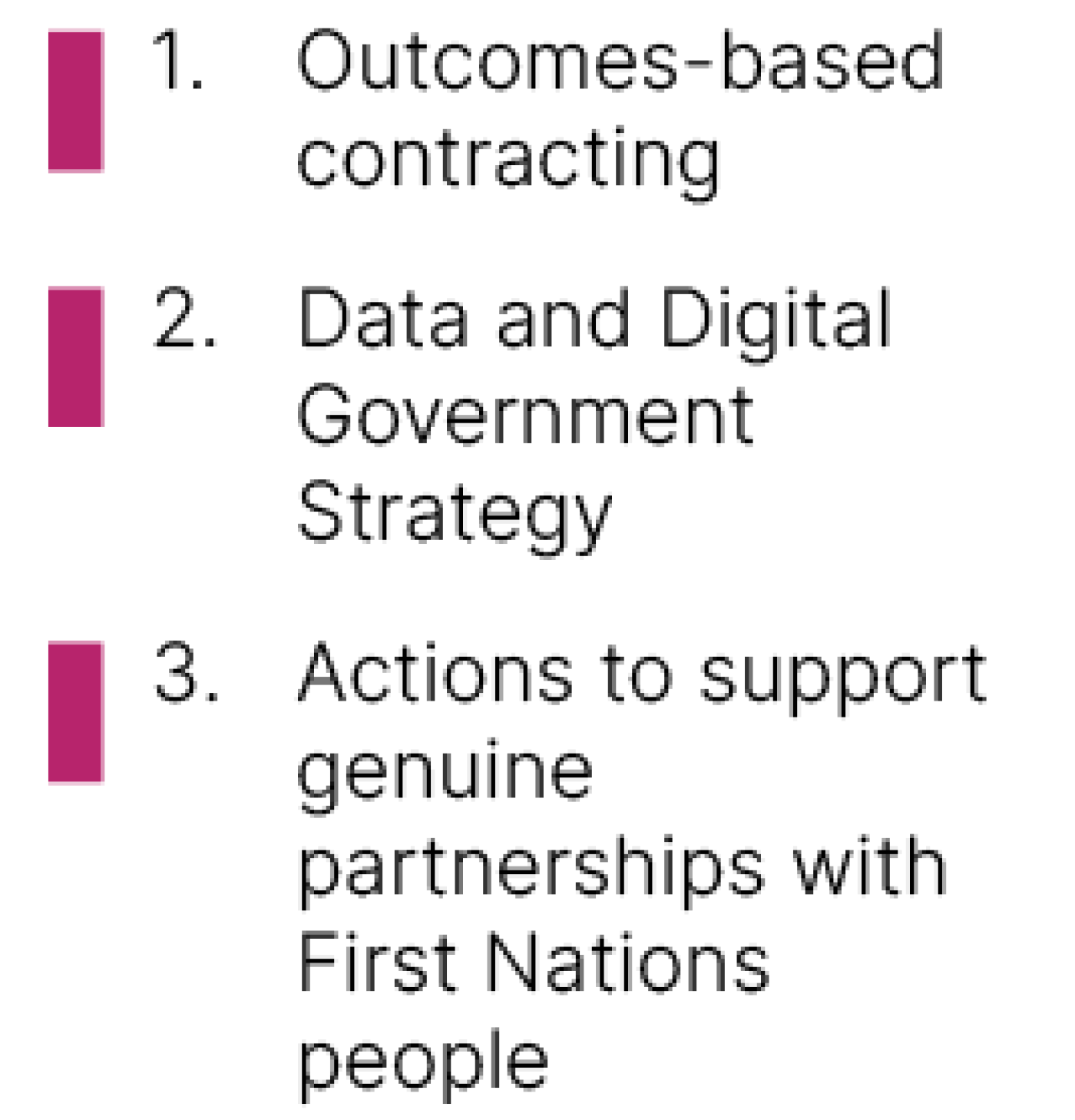
Image
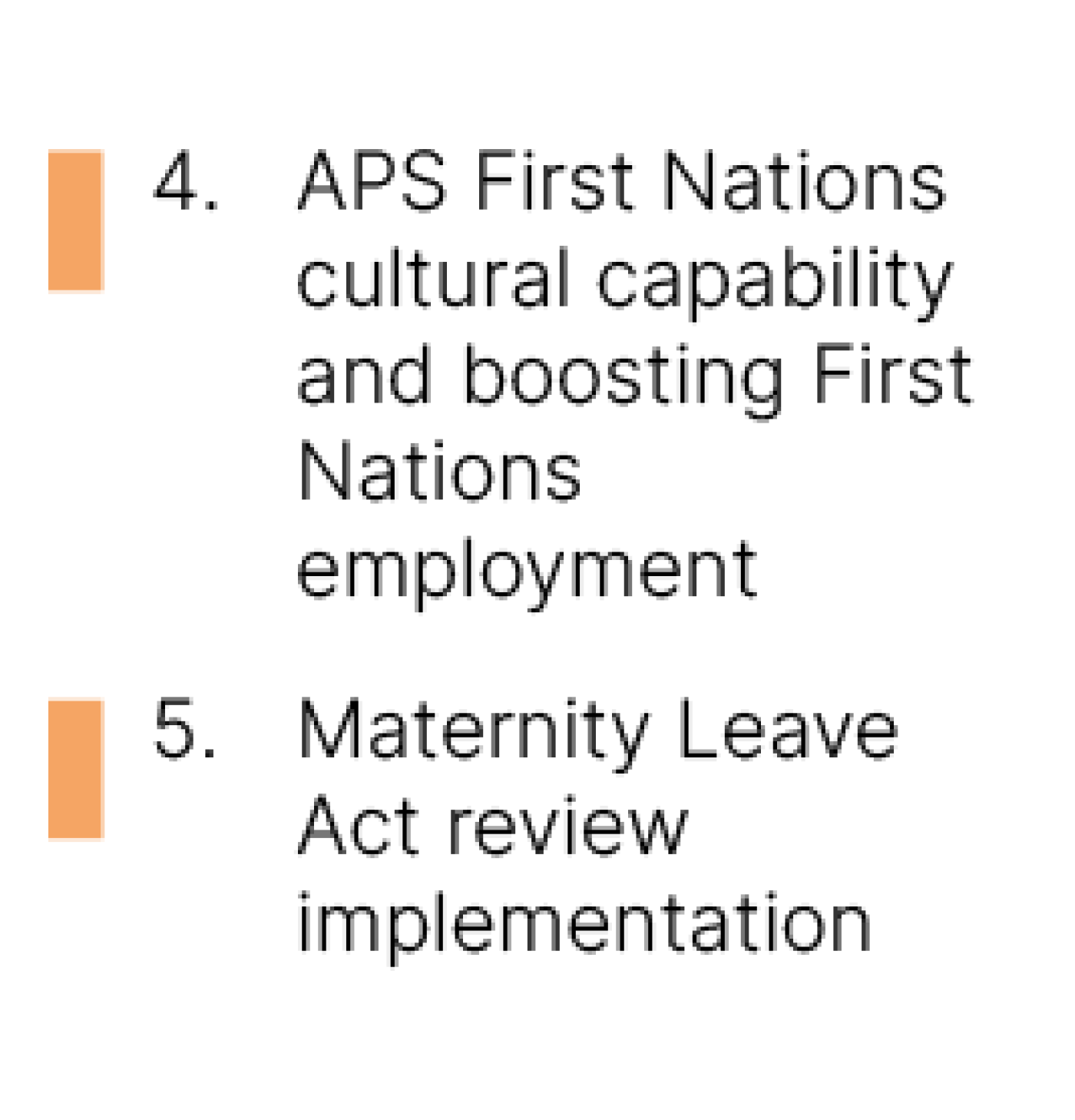
Image
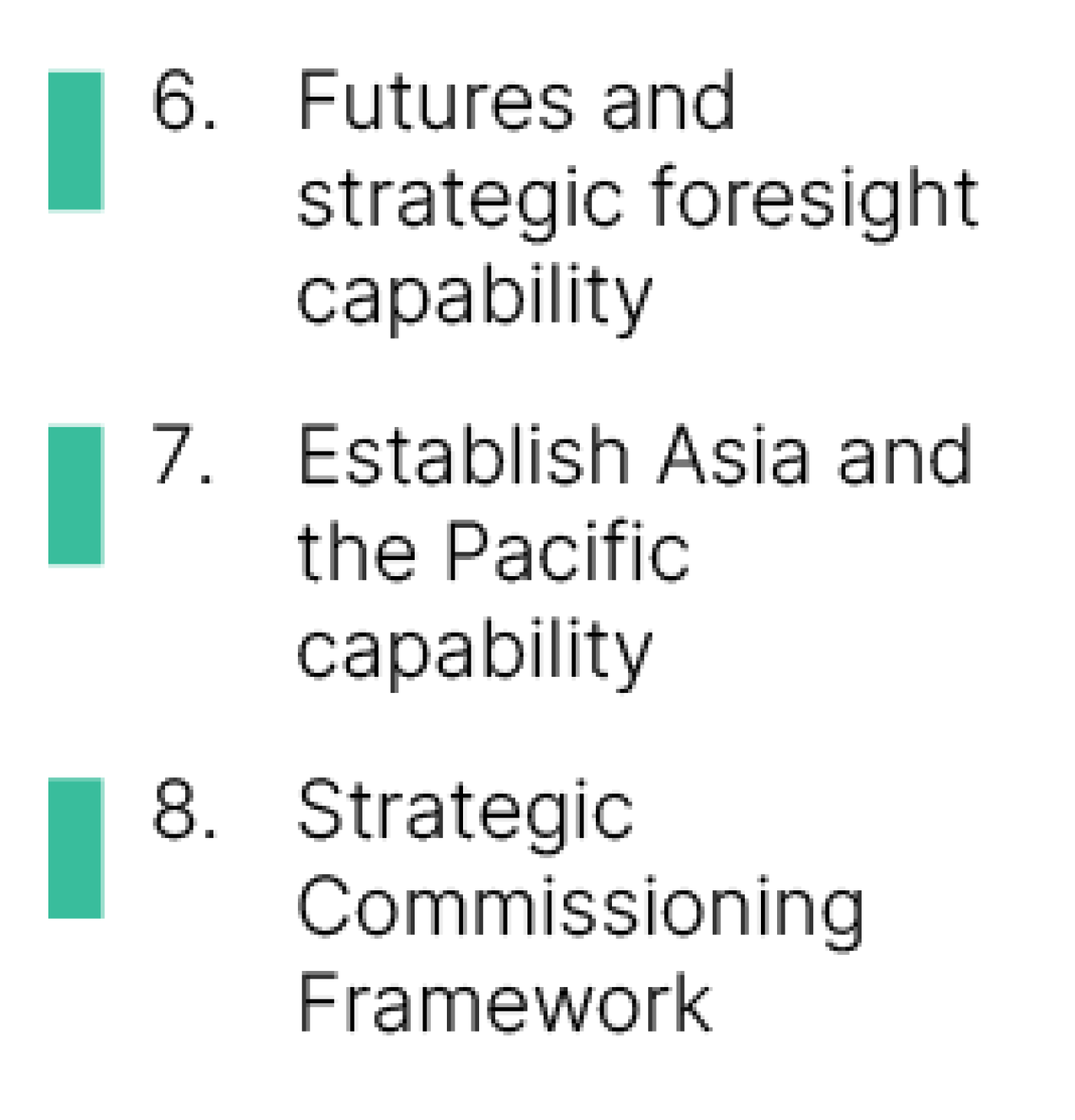
| Image
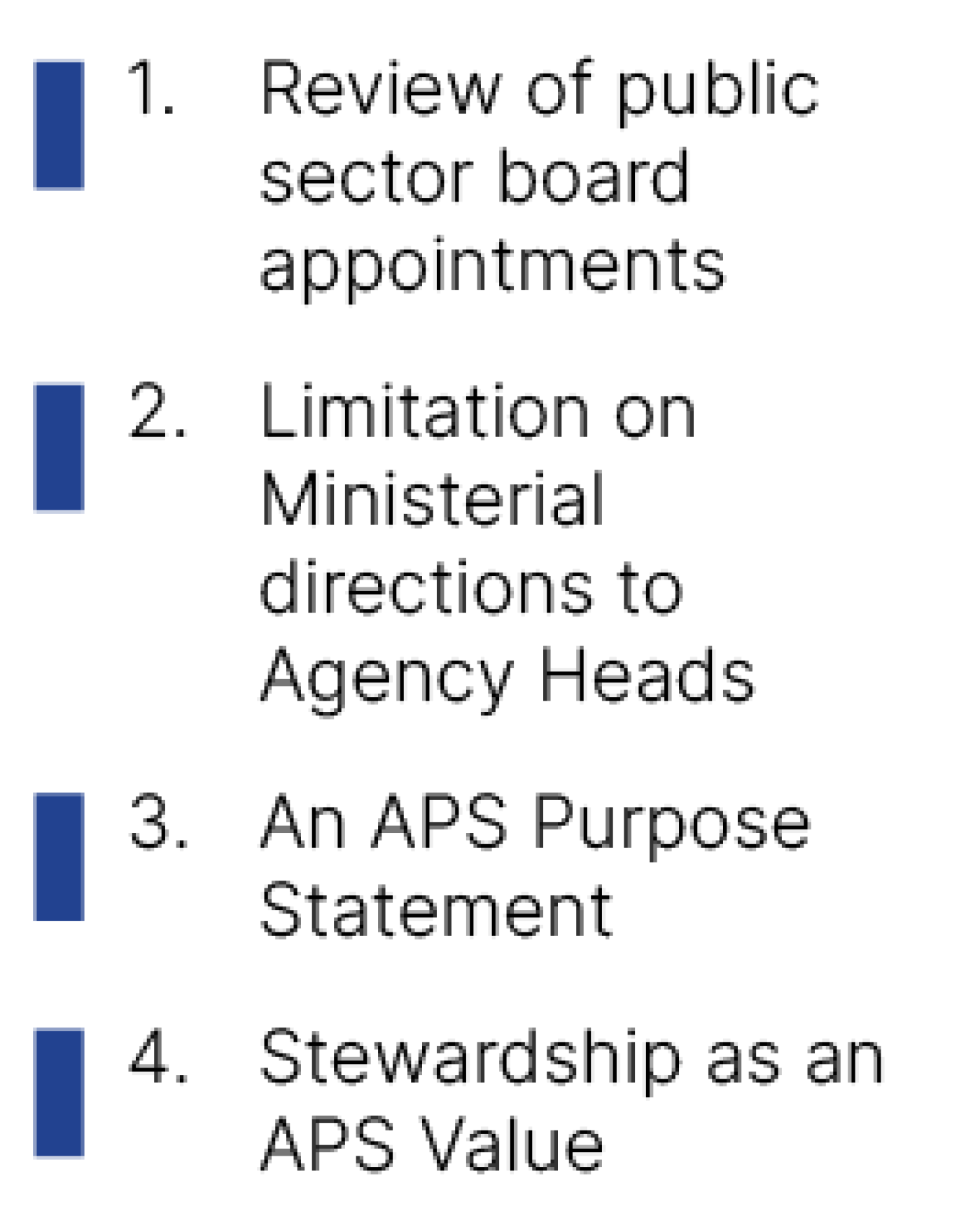
Image
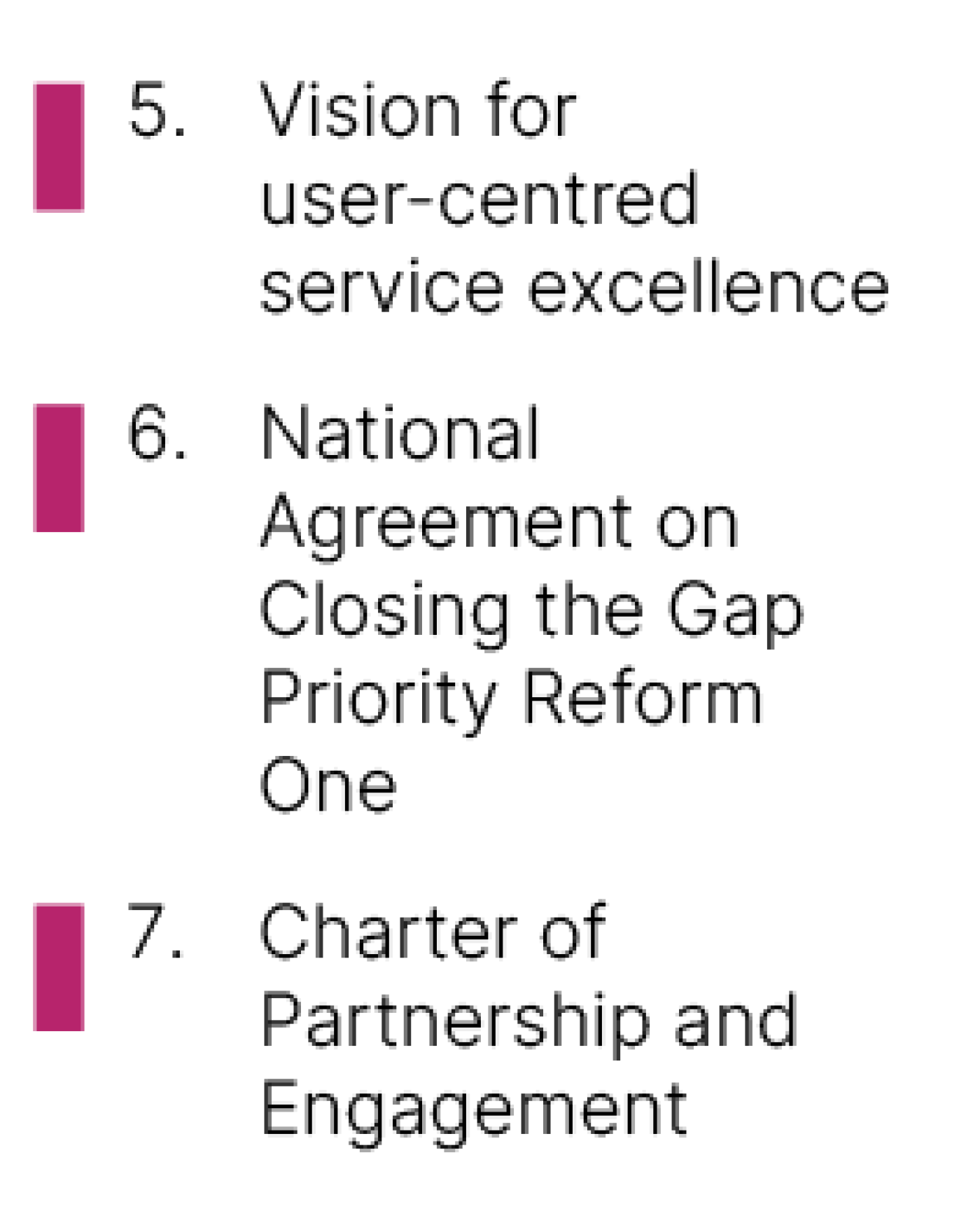
Image
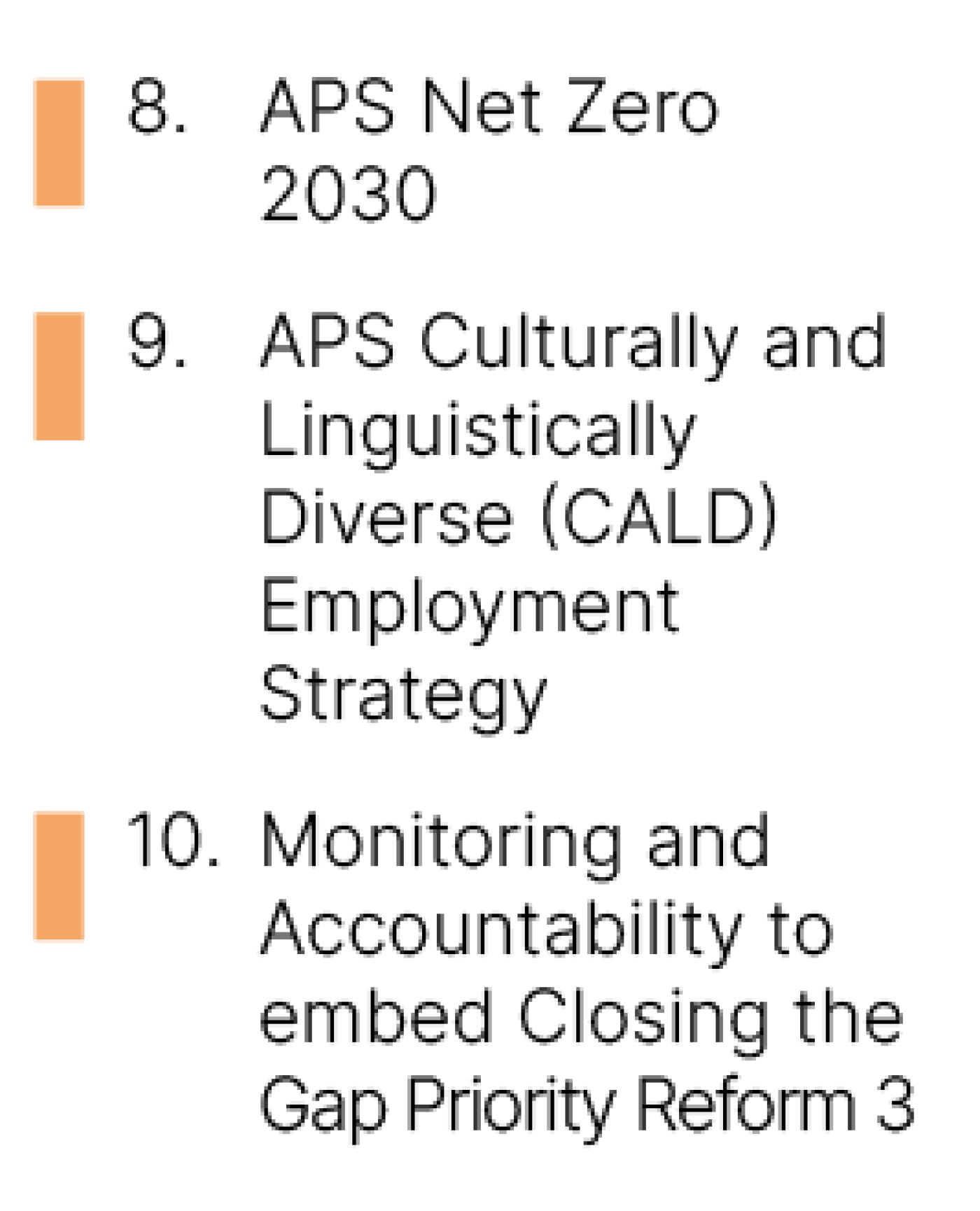
Image

| Image
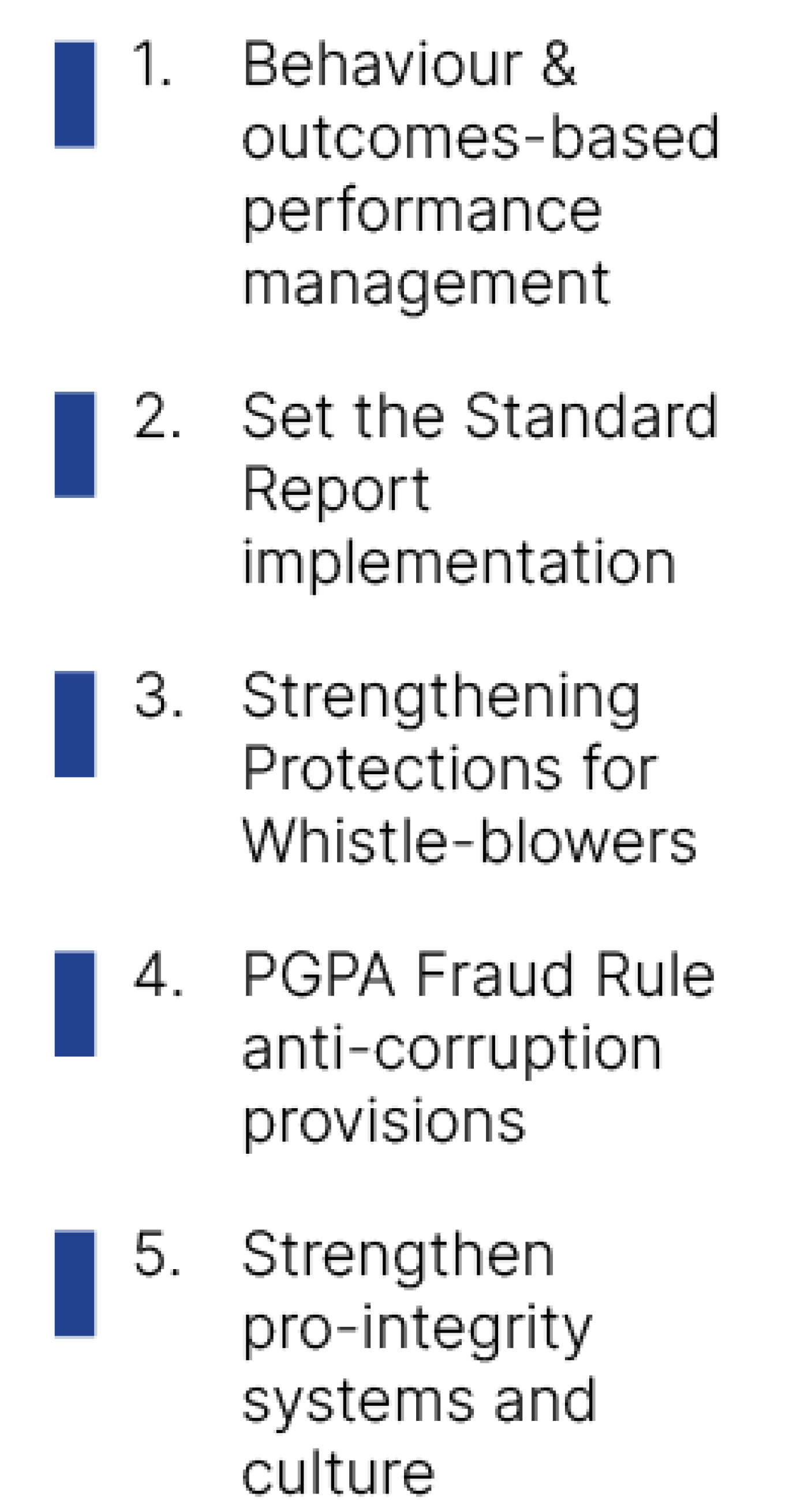
Image
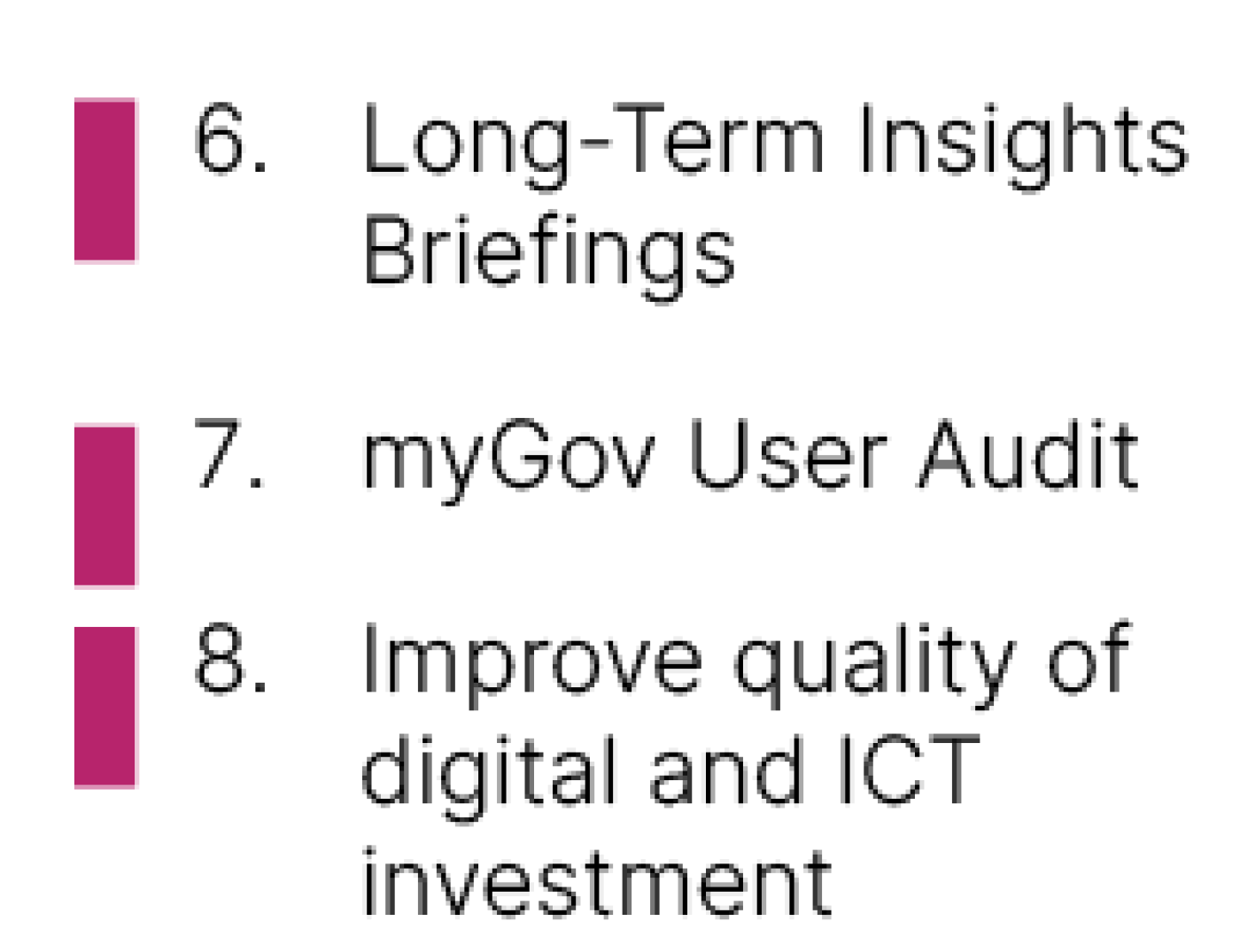
Image
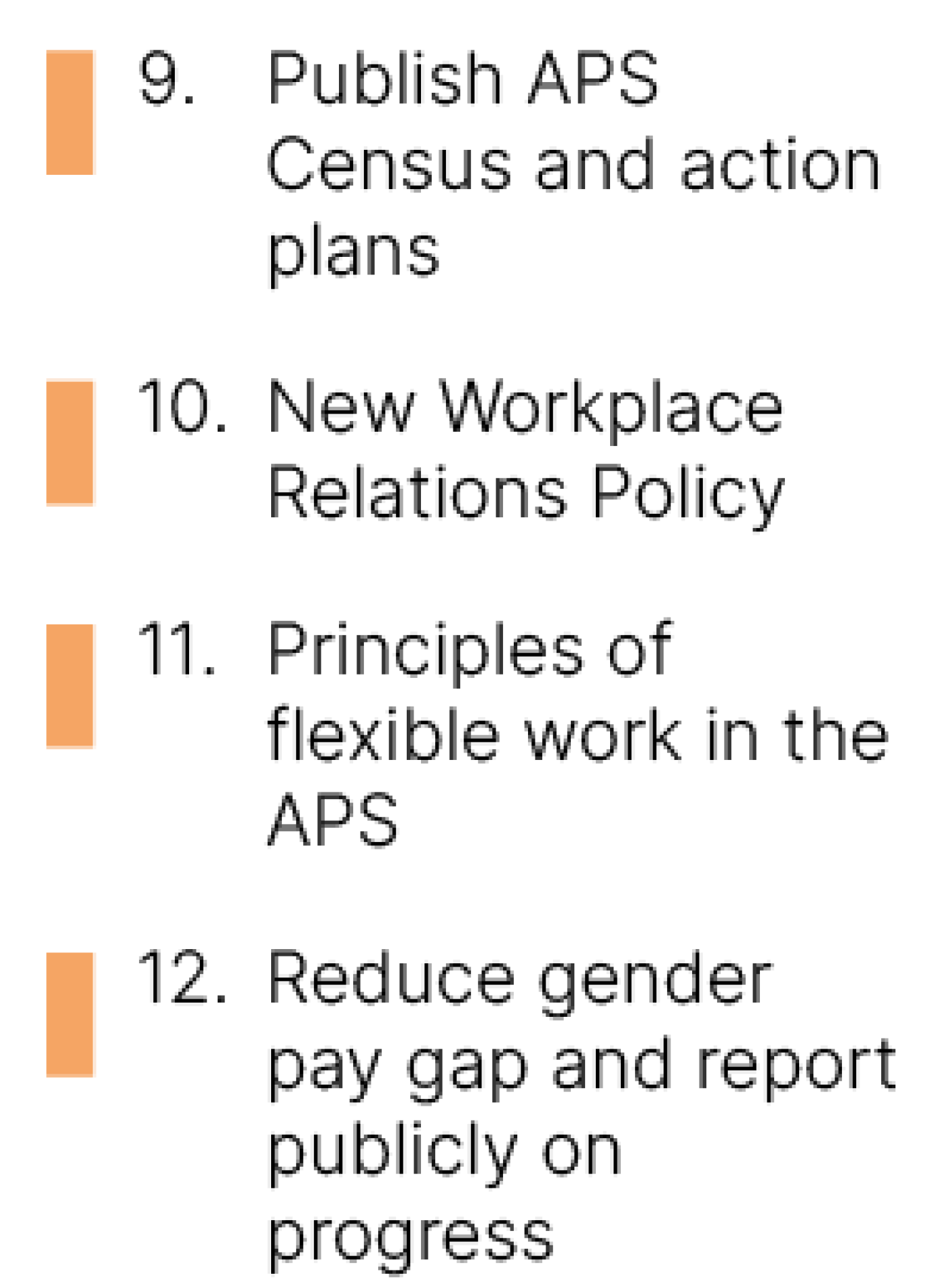
Image
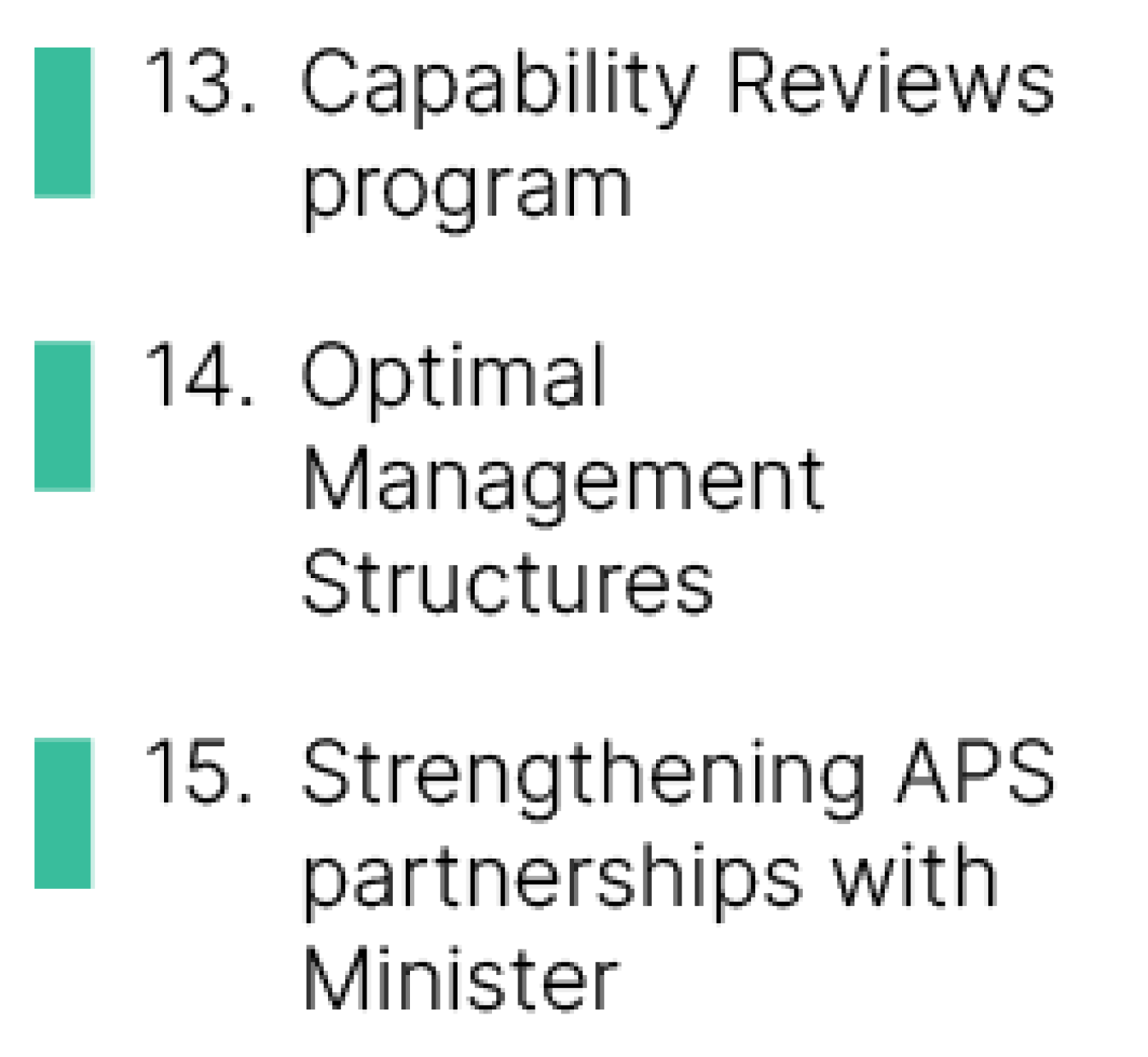
| Image
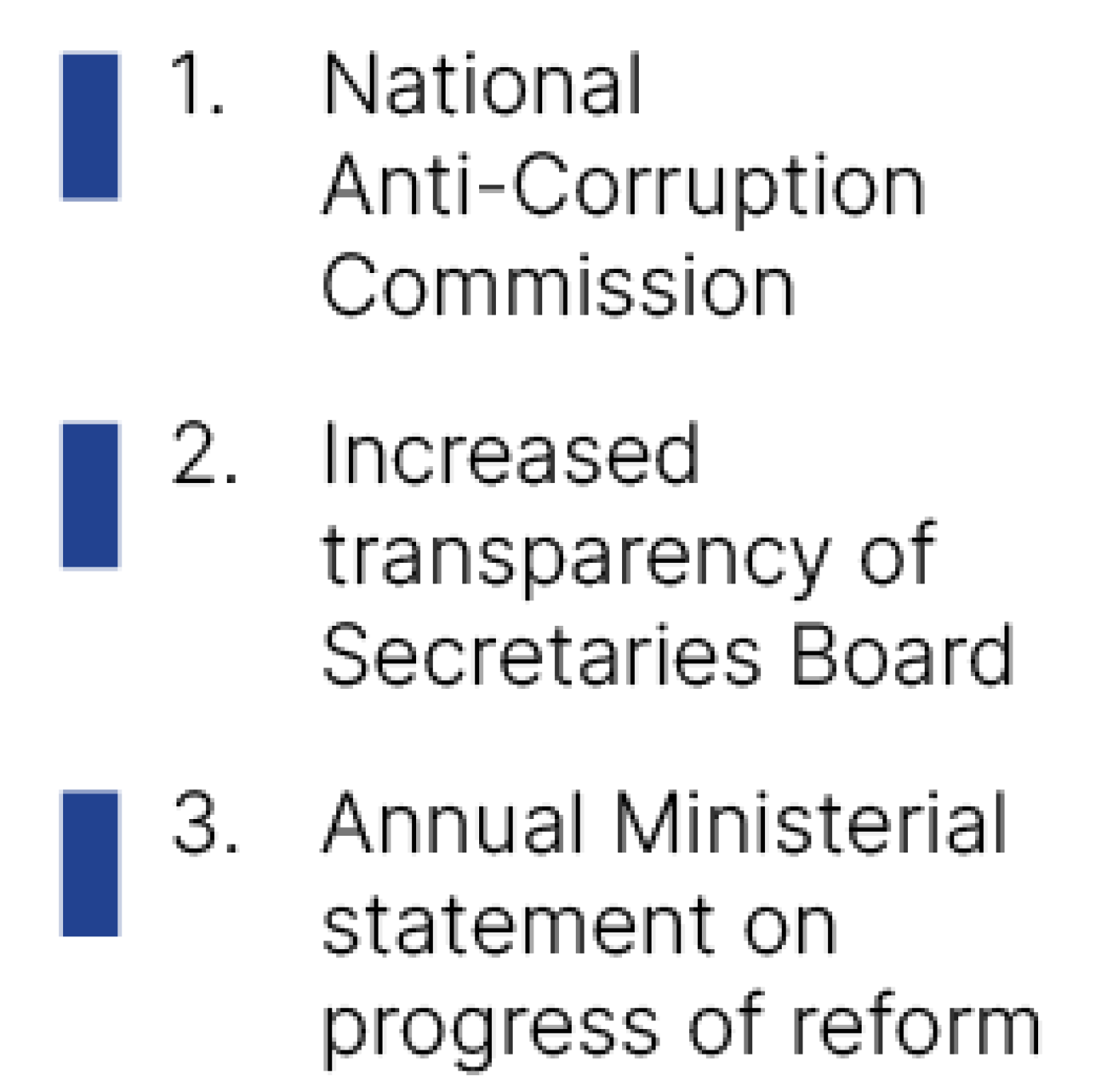
Image
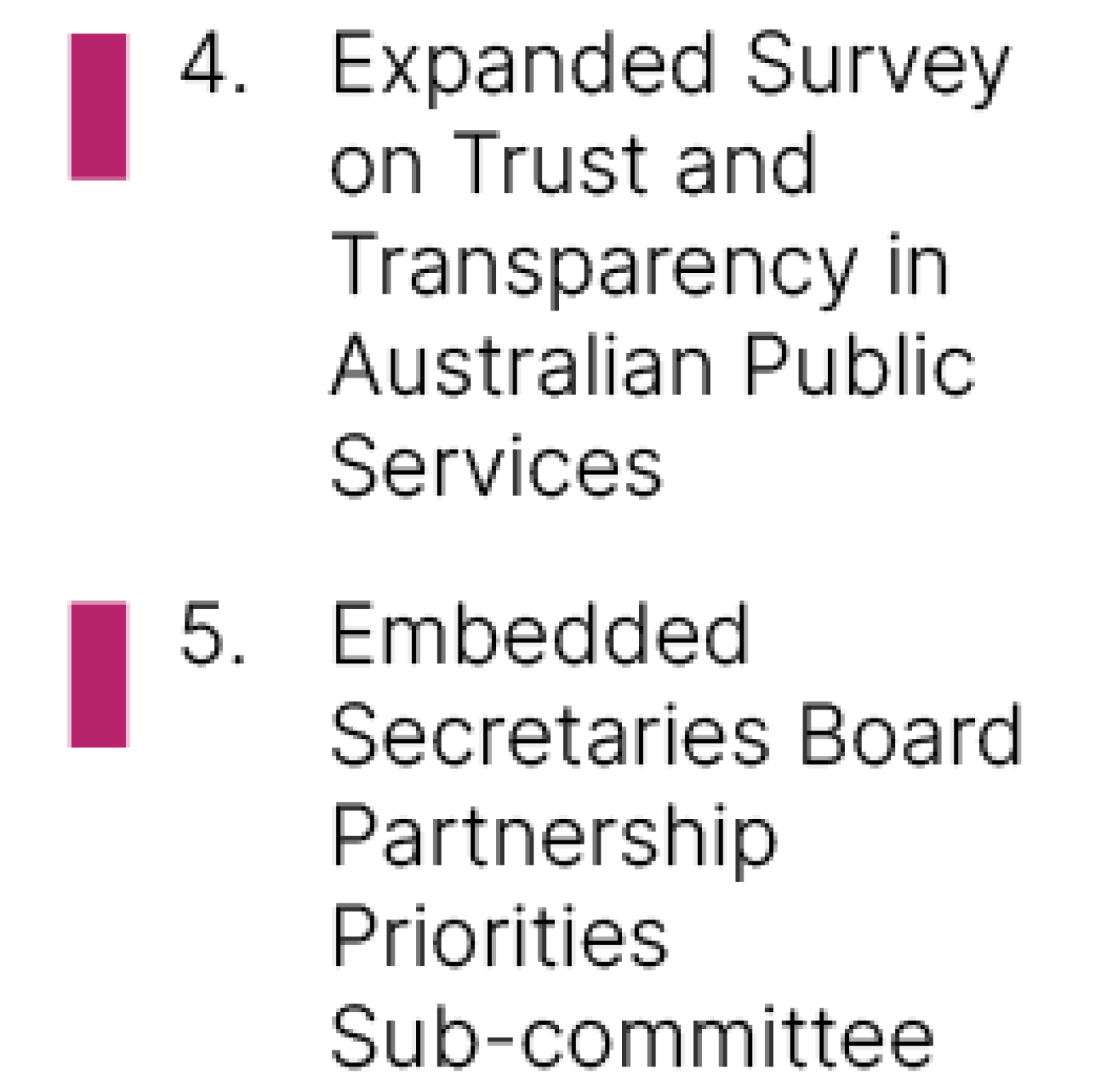
Image
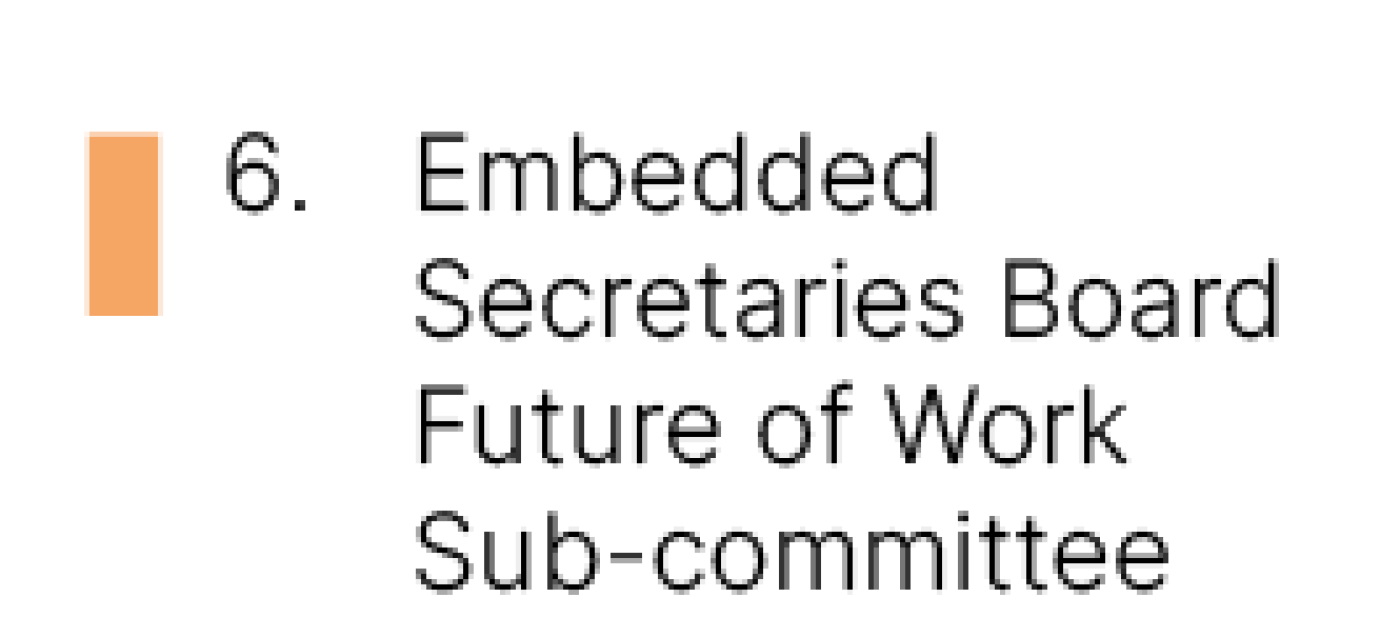
Image
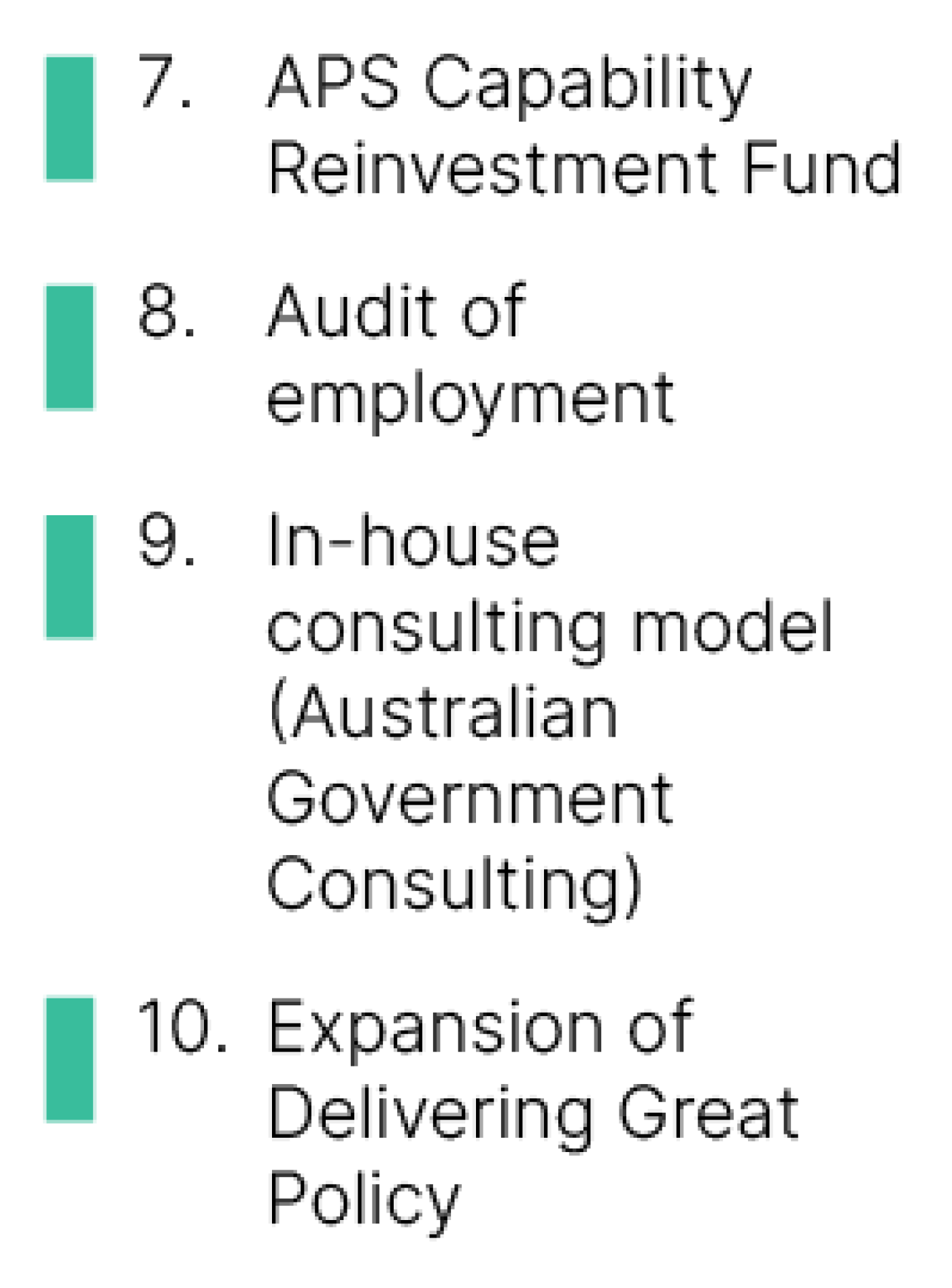
|

Pillar One: The APS embodies integrity in everything it does
Outcome 1: Public sector employees act with and champion integrity
Ensuring that public sector employees are supported by a pro-integrity system, and culture is key to APS Reform. Employees need to understand what integrity means, their responsibilities, and uphold integrity; championing this in the context of their daily work and behaviours. Improving understanding of the Commonwealth integrity architecture ensures a strategic and effective approach to preventing, detecting and sanctioning fraud and corruption, protecting whistle-blowers, and enabling pro-integrity behaviours. By doing this, trust and confidence in the APS and government is increased and ongoing reforms led by Secretaries’ Board such as the Secretaries’ Charter of Leadership Behaviours are reinforced
Structural change to lock-in integrity across the APS
The first phase of APS Reform initiatives included several that are making permanent structural changes to legislation, and whole-of-government frameworks, to strengthen the Commonwealth integrity architecture. This includes the introduction of the Public Service Amendment Bill, which as at September 2023, is before the Parliament. This also includes the passage of the Public Interest Disclosure Amendment (Review) Act 2023, the National Anti-Corruption Commission Act 2022, and National Anti-Corruption Commission (Consequential and Transitional Provisions) Act 2022, and work to reform the Commonwealth Fraud Control Framework 2017.
These changes will strengthen the importance and focus on integrity within the governing architecture of the APS. The recently established National Anti-Corruption Commission (NACC) is already demonstrating this. Commencing operations on 1 July 2023, the NACC works to enhance integrity in the public sector by deterring, detecting and preventing corrupt conduct involving Commonwealth public officials through education, monitoring, investigation, reporting and referral. Complementing this work is the initiative to strengthen protections for whistle-blowers which has already resulted in priority amendments to the Public Interest Disclosure Act 2013 to strengthen whistle-blower protections and complement the work of the NACC.
Additionally, under the Public Governance, Performance and Accountability (PGPA) Fraud Rule anti-corruption provisions initiative the Government is strengthening Commonwealth entities’ measures to prevent, detect, and respond to corruption, by extending the legal requirements of the Fraud Rule under the PGPA Act. Changes will require relevant agencies to act on corruption as well as fraud; an Exposure Draft of the Rule amendments has been released.
As part of the Limitation on Ministerial directions to Agency Heads initiative, the Government seeks to strengthen the apolitical nature of the APS under the Public Service Act 1999, through the Public Service Amendment Bill 2023 – as at September 2023, the Bill is before the Parliament. Subject to the passage of legislation, this amendment will strengthen the requirement that individual APS employment decisions must be made free from political interference.
Refining standards to support a culture and behaviour that embeds integrity
Beyond amendments to legislation, other initiatives are refining APS integrity standards to positively influence the behaviour and culture of individuals as well as workplaces across the APS.
The initiative strengthening behaviour and outcomes-based performance management establishes an overarching set of requirements for all APS agencies to incorporate into their performance frameworks. This will embed a culture of transparency and accountability for performance. An SES Performance Leadership Framework was launched in August 2023 and APS agencies are required to fully implement the Framework by 2025. A non-SES Performance Framework will be developed and published by the end of 2025. These frameworks will build consistency across the APS, and provide assistance to managers to meet the formal requirement that behaviours must be considered equally with outcomes. Increased emphasis on workplace behaviour will support psychological safety for our people, and the creation of a better culture across the APS.
The Government continues to implement remaining government-related recommendations in the Set the Standard Report implementation, aimed at ensuring Commonwealth parliamentary workplaces are safe and respectful.
Scoping other ways to enhance integrity in the APS and on government boards
Finally, several initiatives seek to ensure that public sector employees act with and champion integrity, including through reviewing processes and asking what else can be done. The APS Integrity Taskforce has delivered on an action plan recommending ways of improving integrity in the APS as part of the strengthening pro-integrity systems and culture initiative, and the Review of public sector board appointments initiative, led by Ms. Lynelle Briggs AO, responds to concerns about transparency in appointment processes for public sector board appointments. These initiatives will help inform future initiatives or reforms to strengthen integrity in the APS.
Outcome 2: Public service employees are stewards of the public service
Initiatives supporting Outcome 2 seek to strengthen the role and purpose of what it means to be a public servant, making sure everyone in the APS understands their role and responsibilities. The Thodey Review identified a need for the APS to develop a more cohesive and collaborative culture across the diverse functions and agencies that make up the public service. In line with this, recent events have shown the need for public servants to individually and collectively protect the institution of the APS. This includes looking ahead to identify and meet challenges with the interests of all Australians in mind.
The first phase of reforms under this outcome seeks to define and clarify the individual and collective roles and culture of the APS, now and into the future. Building on this founding definition, other initiatives seek to promote understanding to ensure public servant employees understand the importance of their enduring role, and to clarify for the Australian public the purpose and workings of the APS and the Government.
Defining the shared purpose and values of the APS
Better defining the role of the APS and public servants, and setting the standards of how APS employees should act in carrying out their duties is critical. Two key initiatives support this by drawing from a range of sources to adequately provide direction on a common purpose and set of values for the diverse functions, agencies and individuals of the APS. Developing this shared understanding is key to enable culture and behaviour change.
The Government seeks to add Stewardship as an APS Value under the Public Service Act 1999, through the Public Service Amendment Bill 2023 – as at September 2023, the Bill is before the Parliament. Currently under the Public Service Act 1999, only Secretaries, the APS Commissioner and Secretaries Board are required to act as stewards of their departments and the APS. The Bill aims to enshrine stewardship as an APS Value so that all public servants are required to act in a way that upholds the Value at all times. By doing this, public servants will be cognisant of how their individual behaviours contribute to the stewardship of the APS. The new Value has been defined as “The APS builds its capability and institutional knowledge, and supports the public interest now and into the future, by understanding the long-term impacts of what it does,” and was developed by extensive APS and public consultation.
The Bill also proposes a legislative requirement for the creation of an overarching APS Purpose Statement. The statement seeks to create a unified and collaborative culture across the diverse functions comprising the APS. Work is already underway to develop the statement and has sought input from a deliberative committee consisting of 40 staff members representing 22 agencies and a diverse range of cultural and linguistic backgrounds, abilities, sexualities, genders, locations, ages, and classifications, as well as approximately 9,000 additional pieces of feedback.
Increasing oversight of APS activities
Two initiatives will increase awareness of the role of the APS and transparency of its work. First, the Minister for the Public Service will deliver an annual Ministerial statement on the progress of reform. This update will not only provide an opportunity to review the agenda for future reform but will also boost awareness, an understanding of APS Reform, and support change. The Minister is due to deliver the statement in November 2023.
Second, several steps have been taken to increase transparency of Secretaries Board. These efforts provide Australians greater clarity on the purpose and workings of the APS leadership. Secretaries Board meeting communiques and the Terms of Reference are now published online, with information about Secretaries Board sub-committees and their meeting communiques now published on relevant departmental websites. As a central pillar of governance across the service, these measures increase transparency of senior collective leadership effort across the APS.
Pillar Two: The APS puts people and business at the centre of policy and services
Outcome 3: The APS delivers human and user-centered policy and service excellence
Genuine partnership and engagement with Australia’s people, communities, non-government sectors, academia and industries is key to developing policies and services that reflect the needs and aspirations of the people they affect. The APS must have clear principles for when and how it engages in partnership, to instil public trust and transparency in government institutions and processes. This will help embed integrity in public service culture and behaviour with communities. The APS must also be proactive in ensuring policies and services are accessible and meet user needs. By delivering human-centred services and harnessing digital and data systems, the APS can build community trust, confidence and satisfaction in public services.
To achieve this outcome, the initiatives in Phase One focus on four areas. The first is laying the institutional structures to ensure that meaningful engagement with the public is a core feature of the APS. The second is a set of initiatives that set the standard for what APS partnership and engagement should aspire towards. The third is uplifting capability to deliver policy and services that are human centred. Finally, a set of initiatives are developing greater understanding about the APS’s operating context to improve trust in the APS, demonstrate its ability to address future challenges and outline how the APS’s capability could be further strengthened.
Laying the institutional architecture for engaging community
To deliver human and user-centred policy and service excellence, the APS can embed institutional structures that champion and facilitate engagement with communities. The Partnerships Priorities Sub-committee promotes a coordinated effort in delivering user-centred policy and service excellence by embedding partnership culture and behaviour across the public service. This includes making engagement and co-design with communities, states and territories, businesses, NGOs and universities a natural and early impulse in how the APS works. The Sub-committee is driving work according to established international standards of engagement, which enables a clear benchmarking of practice. The influence of this work is being seen in the APS through programs such as the Capability Reviews.
Uplifting the standards for APS partnership and engagement
The development of a Charter of Partnerships and Engagement sets out principles for improving the way the APS puts people and business at the centre of policy, implementation and delivery. It aims to support agencies to build capability to genuinely partner and engage with Australia’s people and communities, non-government sectors, academia and industries to develop more responsive policies and programs. The Charter will help realise the Government’s commitment to genuine partnership and engagement in policy-making and service delivery with the public so that policies and programs are more likely to be sustainable and deliver against government and public expectations.
Designing a shared whole of APS vision for user-centred service excellence will help to clarify what the public service is working towards for APS employees and the public. It creates a clear standard to be measured against, with the ability to find where there are gaps in user satisfaction and trust, and where there are insights to be drawn from areas of strength. The creation of this vision is also an opportunity for staff to engage with the concept of user-centred service and to help embed that concept in everyday work.
The APS is establishing a whole-of-service approach to outcomes-based contracting with third parties to deliver services for Australians. This initiative seeks to support increasing APS officers’ expertise in writing statements of requirements applicable for the circumstances in which external consultants are appropriate; meaning it is only pursued in cases where the work is more efficiently or effectively outsourced than completed internally, or when independence is required. It will also ensure the entity maximises the benefit from the procurement of any such external arrangement.
Investing in data and digital capability uplift
As digital transformation continues at rapid pace across Australia and the world, it is critical that the Australian Government remains at the forefront of data and digital technologies to improve how it develops policies and delivers services. Therefore three initiatives under this outcome relate to developing digital and ICT capability and services that meet communities’ needs and expectations.
The Data and Digital Government Strategy is a whole-of-government strategy setting the vision for how the Government will deliver simple, secure and connected public services for all people and businesses through world-class data and digital capabilities. The Strategy reflects the need for the Government to continue its own data and digital transformation to ensure it can meet the public’s expectation and demand for digital services, data-informed policies and decision-making, as well as ensuring the APS is prepared for the digital age.
Efforts to improve the quality of digital and ICT investment aim to ensure APS stakeholders and partners receive high quality and timely advice on their digital investments, whole-of-government strategies, policies, and standards relating to digital and ICT investments. This initiative is progressing well through the role of the Digital Transformation Agency (DTA). As the Government’s trusted advisor on digital and ICT matters, the DTA provides strategic and policy leadership, investment prioritisation, contestability, and assurance oversight across the Government’s digital and ICT investment portfolio, engaging via the Government’s Digital and ICT Investment Oversight Framework (IOF). The IOF supports engagement across the entire digital investment lifecycle – from early planning, approvals, project delivery and the realisation of benefits. The DTA undertakes regular data collections on investment health, analysis and reporting that serve to inform the Government’s decisions relating to its digital and ICT investments. This work provides stakeholders and partners with high quality and timely advice on whole-of-government strategies, policies and standards for digital and ICT investments, which helps agencies deliver better digital outcomes.
The myGov User Audit is an independent review of the user experience, functions and performance of myGov in the context of being the primary front door to the Government’s digital services. The user audit was released in January 2023 and provided findings and recommendations for the future of myGov. The user audit recommendations have provided Government with a path forward that requires a long-term commitment to invest in myGov as critical national infrastructure. The Digital Transformation Agency and Services Australia are working in partnership to develop a joint response to the myGov User Audit for Government’s consideration in the 2023-24 Mid-Year Economic and Fiscal Outlook context. Work is progressing with collaboration and engagement across whole-of-government to develop a high-level position to each recommendation for Government.
Understanding the operating context: trust in the APS and future challenges
Two initiatives seek to develop more understanding about the APS’s operating context – both current and anticipated – to determine how the APS could be further strengthened.
The Survey of Trust and Transparency in Australian public services provides a core dataset that can be used by policymakers to better design or improve policies, building on the revised approach to partnerships. It helps the APS better understand community sentiment around their use and experience of Australian Government services. Publishing an expanded annual report on the Survey and monthly results (via a dashboard) ensures that appreciating user experiences remains a core part of the development and delivery process, and in turn builds greater trust and satisfaction within the community.
The Long-Term Insights Briefings initiative will strengthen institutional capability in the APS for analysing significant, complex, longer-term, cross-cutting and strategic policy challenges that may affect Australia and the Australian community in the medium and long-term. The briefings are developed through a process of consultation with the Australian community on issues affecting them, as well as with experts from the public service, academia, industry and the not-for-profit sector. By engaging with the public and the APS more broadly, the briefings will assist in developing an understanding of the evidence, context, trends and implications of the issue over a long-term horizon and position the APS to better deliver for Australians.
Outcome 4: The APS has effective relationships and partnerships with First Nations peoples
Central to APS Reform is supporting the APS to build full and genuine partnerships with First Nations communities and organisations, including through delivering culturally safe services through respectful engagement and building genuine partnerships. The APS must build relationships based on mutual trust and respect with culturally safe engagements. It is through this first step of building relationships that shared decision-making with Government on policies and programs that impact First Australian peoples can be enabled.
The initial initiatives that are working towards this outcome are currently in design. It is anticipated that these initiatives will lay the groundwork, structure and relationships to develop genuine and meaningful partnerships with First Nations peoples and communities.
Under the National Agreement on Closing the Gap, Priority Reform One agencies will work individually and collectively to set up structures and an approach to ensure formal partnership arrangements support Closing the Gap. To support best practice across all portfolios in establishing and strengthening partnerships and shared decision-making with Aboriginal and Torres Strait Islander people, this has included the development of the Commonwealth Aboriginal and Torres Strait Islander Partnerships and Engagement Framework.
Action to support genuine partnerships with First Nations people is undertaking early scoping to consider the need for any systems or legislative change required to transform mainstream government organisations, to enable formal partnerships and shared decision making with Aboriginal and Torres Strait Islander people.
Pillar Three: The APS is a model employer
Outcome 5: The APS’s employee value proposition is attractive
Ensuring the APS is a great place to work and offers a quality employee experience is key to attracting and retaining the best and brightest public servants. APS Reform efforts are focussing on creating an attractive employee value proposition for current and future employees, including improving working conditions and lifting pay. Under this first phase, there are several initiatives that make operational changes to improve the working conditions and overall value proposition of the APS. Accompanying these initiatives are actions designed to ensure long-term oversight and accountability for conditions, and the broader employee value proposition of the APS. These will ensure that standards are kept high and any emerging issues or risks can be addressed for longevity.
Operational change to promote an attractive APS
Four initiatives are centred around policy change that make the APS a more attractive place to work, while simultaneously laying the groundwork for future efforts to improve the APS’s employee value proposition. For example, the New Workplace Relations Policy has focussed on fair and genuine negotiations between employers, employees, and unions through service-wide bargaining. The new policy aims to deliver pay increases and better conditions, while also laying the groundwork to reduce fragmentation of pay and conditions across the service over time. Service-wide bargaining commenced in March 2023.
The Government continues to implement the Maternity Leave Act review. Ensuring that parental leave in the APS meets the needs of today’s employees as they establish families and maintain careers in the Commonwealth is key to attracting and retaining talent in the APS. The Government has tabled parental leave conditions in APS-wide bargaining as an interim step ahead of considering new parental leave legislation to replace the Maternity Leave (Commonwealth Employees) Act 1973.
Access to flexible work has become an increasingly important driver of attraction and retention for employees in the APS and the broader Australian labour market. In acknowledgement of this, in April 2023 the APSC published a set of principles of flexible work in the APS as endorsed by the Secretaries Board. Greater access to flexible work will not only strengthen the APS’s ability to deliver strong outcomes, improve workforce resilience and help employees balance their work and personal priorities, but it will help the APS recruit new staff from anywhere in Australia.
Through APS Net Zero 2030 the Government is taking action to reduce its greenhouse gas emissions to net zero by 2030 (excluding security agencies). By doing this the Government is seeking to lead by example on workplace efforts to ensure emissions reductions, and is upholding its commitments in the United Nations Framework Convention on Climate Change under the Paris Agreement. As part of the interim policy and reporting framework entities are due to start reporting and taking early action in 2023.
Increasing oversight of APS workplaces and employees experience
Two initiatives are underway to ensure there is greater oversight of APS workplaces and employees experience. These initiatives will drive accountability, ensuring issues are addressed and the employee value proposition remains attractive over time.
The initiative to publish APS Census and action plans will, subject to the passage of the Public Service Amendment Bill 2023, which as at September 2023 is before Parliament, establish a requirement for agencies to publish their annual APS Census results and accompanying action plans. This requirement will assist in developing better performance by ensuring there is transparency in agency Census results and the implementation of action plans to address poor results. Results are due to be published by the end of November 2023.
The Secretaries Board Sub-Committee on Future of Work continues to operate as a catalyst in driving organisational and workforce reform priorities for the APS, to address pressures and emerging workforce demands. The Sub-committee meets regularly to provide advice to Secretaries Board on opportunities to strengthen APS workforce and organisational capability, including developing the best value proposition for the APS in the employment market.
Outcome 6: The APS sets the standard for equity, inclusion and diversity
Being a model employer requires the APS to set the standard for diversity and inclusion. Initiatives under this outcome seek to set the standard for inclusion and diversity in the APS as well as developing greater clarity of gender pay inequality in the APS to help reduce the gender pay gap.
Through the APS Culturally and Linguistically Diverse (CALD) Employment Strategy, the Government aims to address concerns about discrimination and racism in the APS. The Strategy will provide tangible actions to promote individual cultural capability across the APS, improve key process points for recruitment, mobility and promotion, and develop an organisational culture that values diversity.
The Government is committed to reducing the gender pay gap and reporting publicly on progress. The Workplace Gender Equality Amendment (Closing the Gender Pay Gap) Bill 2023 requires the Workplace Gender Equality Agency to publicly release 2023 APS Gender Pay Gap data for every agency with 100 or more employees. Enhanced transparency aims to drive accountability that encourages agencies to take further actions to address the gender pay gap.
Outcome 7: The APS sets the standard for First Nations employment and cultural competency
Building the cultural capability of the APS and increasing the number of First Nations staff, particularly at senior levels, is critical to improving outcomes for First Nations communities. Equally important is ensuring retention of First Nations employees. These initiatives are linked to the Government’s commitments under the National Agreement on Closing the Gap, and aim to build cultural safety and eliminate racism in government institutions.
Investing in the APS’s cultural capability
The APS First Nations cultural capability and boosting First Nations employment initiative is making changes to the key aspects of recruitment in the APS and the working environment to better employ and retain First Nations employees. A national affirmative measures round for First Nations SES Band 1 recruitment is expected to commence in 2023. Additionally the APSC’s Cultural Capability Hub commenced in August 2023. This is a central repository of practical guidance and suggested resources to support staff to uplift their Aboriginal and Torres Strait Islander cultural capability. This will be complemented by the APS Academy Footprints program, a cross-cultural learning and professional development framework that supports continuous and ongoing development of cross-cultural capability.
Through Monitoring & Accountability to embed Closing the Gap Priority Reform Three the Government is developing a framework to measure and drive cultural, systemic and structural transformation across APS agencies.
Pillar Four: The APS has the capability to do its job well
Outcome 8: The APS continuously improves its capabilities
To support Australians now and into the future, the APS needs a skilled, confident workforce, and robust and trusted institutions to deliver modern policy and service solutions. To achieve this outcome the APS needs to continuously assess its strengths and weaknesses, and take action to uplift capability over time. Importantly, reforms will reinforce and build upon recent reforms such as the establishment of the APS Academy, APS Professions Stream and APS Surge Reserve workforce.
Under the first phase of reforms initiatives are clustered into four groups. The first two groups lay the foundation for long-term capability uplift by investing in new bodies and frameworks. A third group of initiatives directly invest in known capability gaps while the final cluster of initiatives seek to understand the broader picture of capability in the APS and how it might be lifted overtime.
Structural change to build capability overtime
The APS Capability Reinvestment Fund is an investment in building the organisational capability of APS agencies. Through the Fund the APS is working in genuine partnership to invest in pressing capability needs, for example, embedding iterative evaluation methods in all policy and program roles, and improving gender impact analysis in policy.
The establishment of an in-house consulting model (now known as Australian Government Consulting) addresses the increased reliance on external consultants to deliver strategic products for the APS. This initiative aims to reduce reliance on external consultants, build capability through consulting practitioner skill transfer, leverage existing specialist capability within the APS and provide guidance on how to improve value for money (in the instances where procuring external services remains appropriate). The service is due to begin operation and Guidance on Engaging External Consultants will be available in 2023.
As part of embedding a culture of evaluation the Government established the Australian Centre of Evaluation. The Centre will work to strengthen the quantity, quality and impact of evaluations across the APS. Its purpose is to lead the APS to integrate high-quality evaluation into all aspects of program and policy development to support evidence-based policy decisions that deliver better outcomes for Australians. Doing so enables agencies to better identify whether programs or policies are meeting their intended outcomes.
Setting standards for strategic commissioning
Complementing the in-house consulting model is the Strategic Commissioning Framework. This initiative will set a clear expectation that core APS work must be done by the APS, and will outline limited circumstances in which outsourcing could be appropriate. Agency heads will apply the framework to rebalance their workforce, prioritising direct employment while delivering on their priorities. A resources toolkit will support the framework, connecting agencies to practical implementation guidance including advice on outcomes-based contracting. This initiative will ensure the APS reduces its reliance on contractors and consultants and maximises the benefit of any external arrangements through good contract and supplier management. The framework is due for release in late 2023.
Implementing projects that uplift capability
Five other initiatives seek to address known capability gaps in the APS workforce.
Delivering Great Policy is a program within the APS Academy designed to help develop high-level strategic policymaking skills as well as create connections across different policy networks. Its regular training schedule and networking opportunities are directly improving policy capability through awareness and understanding of the core Delivering Great Policy principles. This initiative is also an example of leveraging practitioner-led learning across the service.
Two pilot programs to establish Asia and the Pacific capability respond to the need, outlined in the Thodey Review, to cultivate a workforce with deep experience in and knowledge of Asia and the Pacific due to the ongoing shift in the global economic weight of Asia. The programs, APS Indo-Pacific Executive Development Program and Pacific Cultural Capability Microcredential aim to develop APS staff’s understanding of the shared challenges facing our region and their levels of cultural competency toward Asia and the Pacific. The APS Academy has partnered with Asialink to co-design and deliver the APS Indo-Pacific Executive Development Program, which is currently open for learner registrations.
Thinking critically and strategically about the future is vital for developing good policy and successful responses to longer term challenges faced by governments. The initiative futures and strategic foresight capability is focussed on broadening the use of futures analysis to inform policy and decision-making across the APS. It aims to improve staff and agency understanding at the operational level of the principles of futures thinking and how to apply those to set strategy, stress-test and refocus policy on outcomes, support decision-making, and improve engagement with stakeholders.
A strong partnership between the APS and Ministers is critical to the development and delivery of policies and services to the Australian community. Without a strong partnership, it is difficult for APS staff to deliver Ministerial objectives. As a part of the initiative strengthening the APS partnerships with Ministers, APS staff’s capability to partner with and build stronger relationships with Ministers and their staff, is being uplifted through information resources and a learning program. Minister’s staff are also attending panel discussions to enhance their capability to build stronger relationships with the APS.
The Optimal Management Structures initiative is helping APS agencies modernise their structures and ways of working. This updated guidance advocates for flatter structures, wider spans of control and decision-making at the lowest appropriate level. Successive reviews have found the APS needs to streamline management and adopt best practice ways of working to reduce hierarchy, improve decision-making, and make best use of APS expertise and resources. The guidance is due to be released in 2023 and will be an important guide to assist agencies operate at their best capacity.
Understanding capability in the APS and the reliance on consultants
Two initiatives have a focus on identifying opportunities to improve capability in the APS.
The Capability Review program will help embed a culture of continuous improvement in the APS and ensure agencies continue to deliver government priorities and outcomes for Australians. Capability reviews are independent, forward-looking and assess an agency's ability to meet future objectives and challenges. They aim to facilitate discussions around an organisation’s desired future state, highlight strengths and organisational capability gaps, and identify opportunities to act on them. Once a review has been completed, agencies then develop and implement action plans to address any capability gaps identified in the review. Four capability reviews have already been completed. The Government has sought to legislate capability reviews as a requirement under the Public Service Amendment Bill 2023 – as at September 2023, the Bill is before the Parliament.
The Audit of Employment initiative collected information across the APS on the use of external labour including contractors and consultants. The report of the Audit was published in May 2023 and provides government with an understanding of the scale and nature of the contingent workforce.
